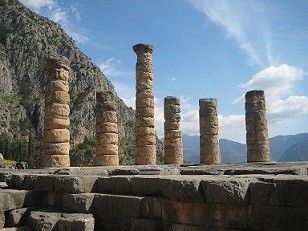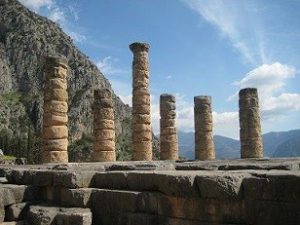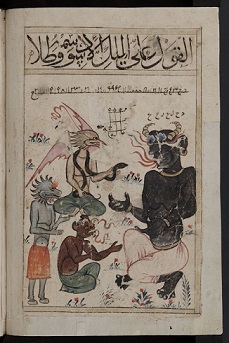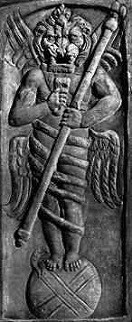Apollyon, the Greek Destroyer
The name Apollyon can be translated as destroyer. Apollyon was the same name of the god of the Sun known to the Greeks, known as Apollo or Apollon.

 A Demonized God
A Demonized God
The name Apollyon can be translated as destroyer. Apollyon was the same name of the god of the Sun known to the Greeks, known as Apollo or Apollon.
The god Apollo acted as the destroyer of evil, but he was also a bringer of doom. He was also known as a god of purification, who was associated with the sun for his ability to be omnipotent.
Apollo was also known as a god of prophecy, as many would bring their sacrifices to him at his temple at Delphi to have their oracle read. The Greeks received oracles from Apollo at Delphi for matters of daily life, and also for military purposes as well.
Apollo as a Destroyer
For example, within the poetry of the Iliad, the god Apollo sends a plague of destruction on the Achaians which could only be stopped through prayers and sacrifices to Apollo1. The practice of offering sacrifices to Apollo lasted well into the third century, and in some places the cult of Apollo lasted until the 6th century CE.
It was also known that Apollo had a holy day each seventh day of the month. The seventh day of each month is holy to Apollon, and, of course, the same tradition is used in the Christian calendar where the 7th day is named after the sun [Sunday] and is considered holy, and as a day of rest
In Greek myth, Apollo was the son of Zeus, a sky-god and the Twin of Artemis, goddess of the hunt and of the moon. Just like Artemis, he carried a bow and arrow which he used to cause destruction. As the goddess Athena watched over Apollon at the battle of Troy, she titled Apollon as the Striker From Afar.2
This is similar to the Biblical John’s writing that tells how Apollyon is from a bottomless pit of destruction. Apollo was known as the twin of Artemis and he had also been referred to as the Striker from Afar (as found in the Hymn to Apollon).
 The Demonization of Apollo by the Church
The Demonization of Apollo by the Church
A god is demonized by a new religion as a way to make the public turn from their old ways. This happened to many Roman and Greek gods, Apollo among them.
When the worship of Apollo was Romanized, adopted by the roman people, he took on an additional title of Apollon Luciferos. Many other Roman gods also took this surname to denote their powers of being a light-bringer. The root of this name belonged to the Greek Phosphorus and eventually the Roman Lucifer.3
The public worship of Apollo in the Mediterranean was in direct competition with the development of Christianity, allegedly during the time that John wrote revelations. The use of the name Apollyon within the bible, as the ‘Angel of the Pit’ was a direct association with this Greek god Apollo as a Satan, an adversary to Christianity4
References:
1. Iliad. Homer. 01.010 “..Apollon, the son of Zeus and Leto, drove pestilence among the Akhaians (Achaeans).”[accessed 11/14/08]
2. Iliad. Homer. 07.034
Athene (Athena) addresses Apollon as the “worker from afar” alluding to his nature, and asks how they might cooperate to stop the fighting at Troy. Again, Artemis refers to Apollon as “striker from afar”.(21.472) Compare this to the ‘abyss’ which Apollyon is known to inhabit in the book of Revelation. [accessed 11/14/08]
3. For a great read on the historical demonization of Apollo, read The Demonization of Apolloyon at the Beloved In Light Blog.
4. King James Bible. Revelations 9:11. http://www.biblegateway.com [accessed 11/14/08]
See also Spiritual Satanist Essay: Prometheus, the Bringer of Satanic Enlightenment
Or, return to the Satanic Demonology Page



